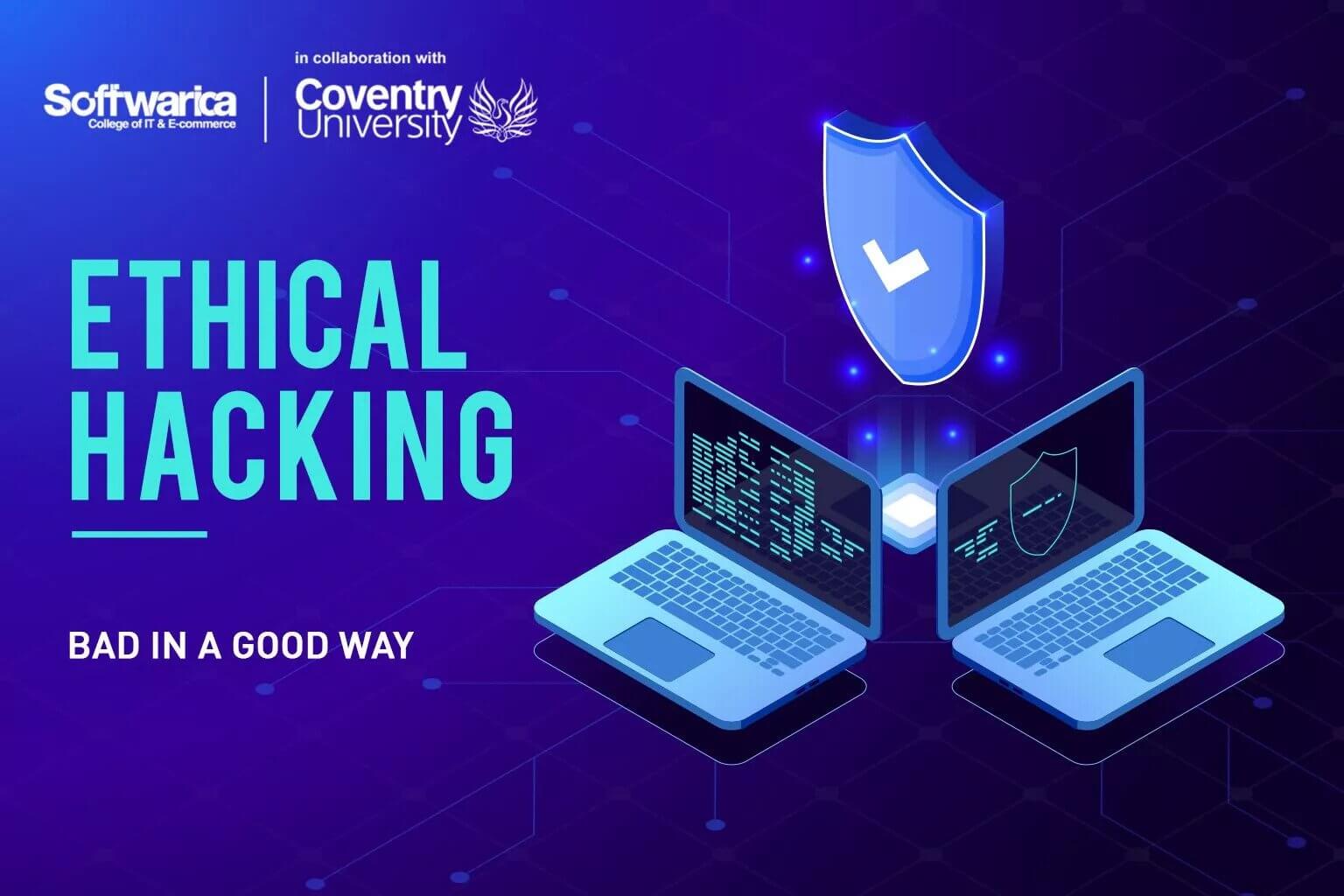
Ethical Hacking – Bad in a Good Way
If you have watched a thriller or spy movie, you have definitely come across the term “hacking” or “ethical hacking”. These two words are one of the most misunderstood words. People often consider hacking to be unethical but what they do not know is that hacking can also be used in a good way – which is called “ethical hacking.” A ethical hacker is some kind of digital Robin Hood who use hacking skills for good in the lawless dark side of the internet.
Hackers (sometimes called black hat hackers) access computer systems and networks with the intention to steal private data, disrupt services, or extort money from an individual or organization. Ethical hackers, meanwhile, are authorized professionals who detect vulnerabilities in the applications, systems, and infrastructure of an organization, identify potential data breaches and cyberattacks and develop solutions to prevent those data breaches.
What is Ethical Hacking?
Ethical hacking is the process of legally exploiting a computer system or network to identify the vulnerabilities of the system and then use the correct security tools and methodologies to rectify them properly. Ethical hackers come into action when there is a threat to the security of the system such as password leaks, data leaks and conventional hacking.
Ethical hackers protect and prepare us for situations that potentially cause threats on a computer network. The main goal of an ethical hacker is to protect their clients from ill-intended hackers, tackle malicious activities and build powerful strategies to fight against online threats.
Ethical hackers follow these four key protocol concepts to execute their work.
- Stay legal: Get proper approval to perform a security assessment.
- Define the scope: Determine the scope of the assessment which is vital for the ethical hacker to remain legal while performing the assessment.
- Report vulnerabilities: Inform the organization about the vulnerabilities discovered and provide recommendations to solve the vulnerabilities.
- Respect data sensitivity: Ethical hackers have to sign a non-disclosure agreement depending on the data sensitivity.
What we can conclude is that Ethical hackers are good hackers who, with permission, identify the loopholes in computer systems and networks and then rectify them with appropriate countermeasures.
Difference Between Ethical Hacking and Unethical Hacking
Cybercriminals perform Unethical hacking with the false intention to access restricted networks and systems and steal sensitive data and money. Unethical hacking is performed to disrupt official website networks and illegally enter the communication between two or more parties. In most cases, the targets do not know about the infiltration as unethical hackers do it quietly in the background. Unethical hacking causes security violations as unethical hackers use illegal techniques to get into the system and destroy information.
On the other hand, Ethical Hacking is performed to find the security vulnerabilities of a computer system to prevent unethical hackers from illegally infiltrating and stealing data from the system. Ethical hacking is also used to identify the weak points in the system to improve its cybersecurity level. Businesses and governments hire Ethical hackers to perform ethical hacking with certain rules and regulations. Unlike, unethical hacking, ethical hacking is completely legal.
| Unethical Hackers’ Objective | Ethical Hackers’ Objective |
|---|---|
| Steal valuable information from another user. | To improve the security framework in a system. |
| To get access to free music and videos. | Checking and updating security software. |
| Gain through transactions and accounts. | Developing security softwares for organizations. |
| To steal valuable information from military/navy organizations and more. | Developing high-security programming languages like Linux. |
| To access restricted networking spaces. | Developing programs like pop up blocker, firewall, and ad blocker. |
Types of Hackers
So far, we know that there are two basic types of hackers, ethical hackers and unethical hackers, but what you might not know is that both ethical and unethical hackers work within three categories, based on their intentions and methodologies. The following are the three types of hackers.
Black Hat Hackers
Black hat hackers are basically cybercriminals who use their hacking skills to attain financial gains and cause digital havoc. Their primary intention is to steal, alter and discard data to cause monetary loss to an individual or organization. Black hat hackers are what have created so many misconceptions about ethical hacking among the masses.
White hat hackers
White hat hackers are who we call ethical hackers. Just like black hat hackers, they can also get into the computer system and computer network but only with the permission of the owner of the organization. With the increasing incidents of cyberattacks and security breaches, both technical and non-technical organizations are looking for white hat hackers in to safeguard their data and information.
Grey hat hackers
Grey hat hackers lie between black hat hackers and white hat hackers. Unlike White hat hackers, Grey ha” hackers get into your system without permission. But they are also pretty different from Black hat hackers as they don’t hack a system for personal or third-party benefits. They do not have a malicious intention and perform hacking for just fun or other various reasons. Grey hat hackers usually inform the owners about the security threats they find in their systems. They often ask for money from the owner for finding a bug in the computer network system.
Both Grey hat hacking and Black hat hacking are illegal as they both perform an unauthorized system breach, although the intentions of both black hat and grey hat hackers are different.
Types of Ethical Hackers
There are various ways through which a black hat hacker penetrates a security system and network and based on the way they get into the system and execute the hacking process. Ethical hackers technically do the same thing but for good reasons. There are basically four types of hacking that a hacker or ethical hackers commonly do.
- Web Application Hacking
Also known as penetrating hacking, web application hacking involves the testing of a computer system or a network to discover security vulnerabilities that have the potential to be easily exploited. This can be done both manually and automatically. Web application hacking is performed to highlight the weakness in the security measurements of an organization.
Web application hacking is ideally performed when you add a new network to the computer system. However, you must consider performing web application hacking regularly to check the security performance of your system. Web application hacking can also be performed to modify the infrastructure, application and end-users’ policies, and apply security patches to the system.
- System Hacking
Also known as network hacking, system hacking is done to get access to the networks with an intend to steal the data. Ethical hackers perform system hacking when a black hat hacker penetrate to the computer network. As system hacking is performed on computer networks, this can results in a huge loss of data from the system. Ethical hackers are the ones who reviewi the security levels of a the computer network to prevent such vicious activities by black hat hackers.
- Web Server Hacking
Web server hacking makes it possible for unethical hackers to get information and data from the web very effortlessly. This is why we are often advised to not share sensitive information on the web loosely. Black hat hackers perform web server hacking to steal sensitive information like passwords and bank account details by carrying out sniffing attacks. from the web. As a solution to this, there are ethical web server hackers in various cyber security departments who can track these cyber criminals.
- Wireless Network Hacking
Wireless network hacking is the most common type of hacking where wireless network hackers access your data from open networks. These hackers can easily access your data handily when you use public Wi-Fi networks. Wireless networks communicate with radio waves which makes it possible for them to get into your computer network from nearby locations. This is why it is recommended not to use public Wi-Fi networks.
Conclusion
Ethical hacking has been highly misunderstood for past few years, but slowly and steadily people are now being aware of its importance. The ethical hacking profession is highly respected and reputed. With the increase of cyberattacks, businesses and governments have already started building up their cyber security infrastructure to protect their systems. So there is no better time than this to start a career in ethical hacking in Nepal. If you want to become an ethical hacker then you must consider studying an ethical hacking course at Softwarica. In collaboration with Coventry University, Softwarica offers the best Bsc (hons) Ethical Hacking and Cyber Security programme in Nepal.


.png)
.jpg)

.jpg)